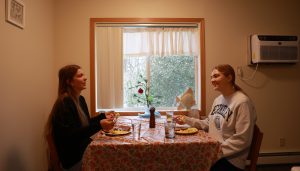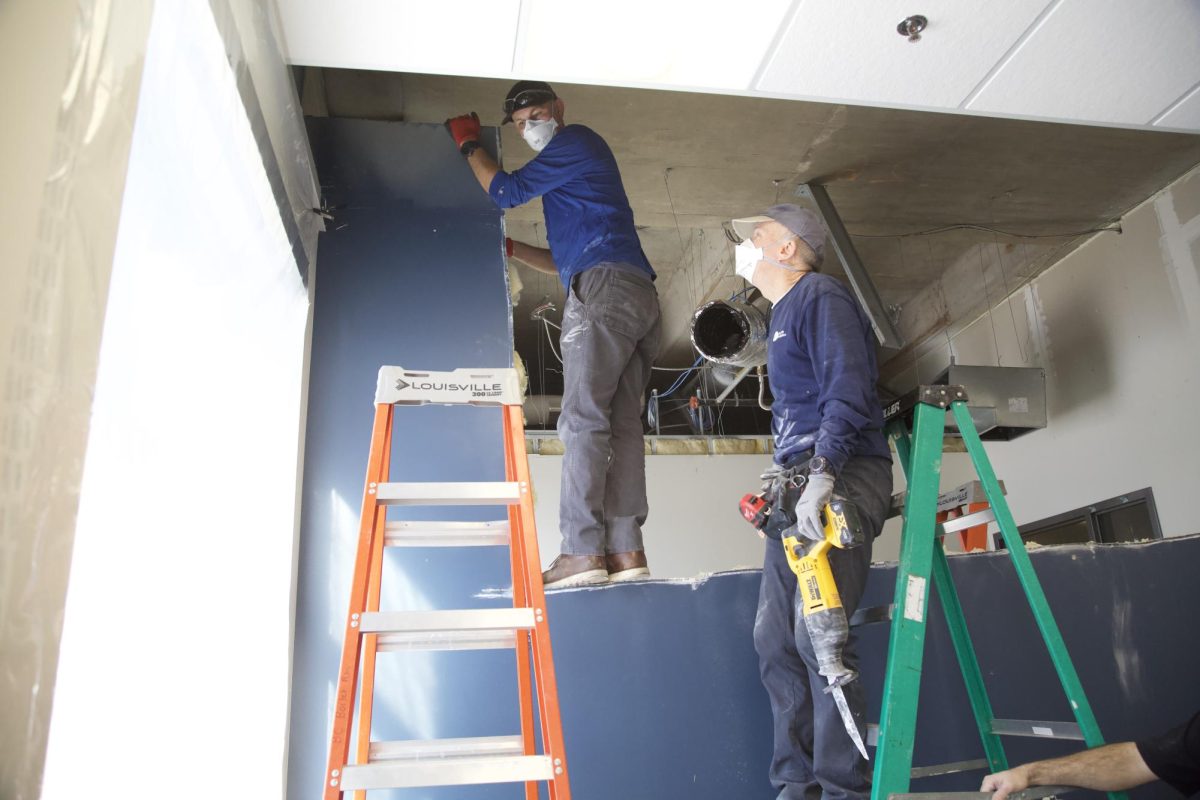It was a warm, late summer day as junior Sophie Jacques moved into her North Village dorm at Bethel University Aug. 15, where she would be residing for the 2024-25 school year. As a student-athlete, she moved in two weeks before the academic year started for preseason volleyball practices. Jacques had no idea that nine days later, she wouldn’t be standing in her North Village dorm but rather in a hall ten minutes across campus that lacked the amenities she expected to have for her junior year.
At the start of the fall semester, mold contamination in Turnwall Hall displaced three Bethel students from their original dorm rooms, and students were offered to relocate to different dorms. Some did, some didn’t. Nearly 2 months later, Bethel University contracted the Institute for Environmental Assessment which inspected the mold, fixed the issues and renovated the rooms.
Nick Cedergren, Associate Dean of Residence Life, knows that the problem of mold is an issue that comes about when dealing with old buildings and the turnover of people moving in and out of dorms every year.
“I don’t think it’s a secret, our buildings are old, and our dorms are old, and this [issue] is part of that,” Cedergren said.
Turnwall 27
On Aug. 23, Jacques received an email from Cedergren. The email informed her that Turnwall 27, Jacques’ dorm, had mold in it. He then provided her with three options:
- She could stay in Turnwall 27 while Bethel University’s facilities management and Residence Life assessed the extent of the mold in the dorm.
- She could temporarily move into Heritage Hall until the mold was assessed and removed.
- She could permanently switch dorms, moving into Heritage Hall for the remainder of the 2024-25 school year.
“Often, if it’s an option to keep the student in the room, we’ll keep them in the room,” Cedergren said. “A two-foot area is not that big of a deal. It wouldn’t be super disruptive.”
Initially, Jacques didn’t think staying in her dorm during facilities management inspections would be that bad. According to Cedergren, another student had problems with mold during the summer living in Turnwall, which initially prompted the investigation. The mold was found on the third floor of the northeast corner of the building. Jacques moved into her dorm the floor below unaware of the mold issue above her.
During move-in, she was also told not to hang anything on the walls but was never given a clear reason as to why. She soon received another email from Residence Life informing her that if she chose to stay in the dorm, workers would be in and out of her dorm looking at the mold.
One night, Jacques returned from volleyball practice to find her dorm floor covered in plastic. A 3-by-3-foot industrial fan had been placed in the middle of the room to help ventilate the pungent smell produced by the plastic and chemicals. But even with the fan, Jacques didn’t feel great due to the smell. She decided to leave the dorm that night but didn’t think it was serious enough to seek medical care. She grabbed her blanket and essentials for volleyball and went to sleep at a friend’s for the night.
After that night, Jacques decided to move into Heritage Hall until the issue was resolved. She met with volleyball coach Gretchen Hunt along with Cedergren to arrange temporary housing and create a plan for moving forward. Cedergren explained to her that however long she stayed in Heritage Hall, a meal plan would be provided, considering Heritage suites don’t have individual kitchens like her original Turnwall dorm had. Additionally, compensation of around $200 was provided by Residence Life each week for students living in temporary residences. Cedergren told Jacques the estimated date she could move back into her original dorm was Sept. 15.
When Jacques moved out, she took only essentials with her. A toothbrush, bedding and a few boxes of clothes. As her date to move back into Turnwall was initially not far down the road, she didn’t think to bring personal items such as her coats, pillows, TV or fridge.
When Sept. 15 arrived, Jacques received an email stating that work was still being done in her dorm and that the move back-date was pushed back to Sept. 30. As her stay in Heritage grew longer, she wondered whether or not she should go back to Turnwall to retrieve the rest of her belongings.

“If we’re going to be back soon anyways, and our friends are here… we might as well wait it out,” Jacques said.“But then it just kept getting pushed back, so it wasn’t easy to make a solid decision of where we wanted to live.”
While Jacques and her roommate, junior Sophia Najarian – who moved in Aug. 30 – lived in temporary housing, Residence Life hired IEA to evaluate mold damage in Turnwall’s northeast corner. Working alongside Facilities Management, IEA tested air and surfaces, comparing results to other areas and the building’s exterior. They identified a drain pipe on the corner of the building as the mold source. After finding the damage to be more extensive than expected, IEA expanded the 3-foot hole, opening the entire wall to address the issue.
“When dealing with mold, there are state laws and policies that you need to abide by,” Cedergren said. “[IEA has] to get permits and let the state know, which is outside of Bethel’s scope, which is why we hired the third-party company.”
After IEA completed its report and documented mitigation strategies for the mold, Bethel hired a third-party contractor to renovate the rooms. For Turnwall 27, this included all new flooring, drywall, paint and insulation along with an AC and heating unit.
Thursday, Oct. 17, Jacques and Najarian were finally allowed to move back into their Turnwall dorm. After about two months, they were welcomed into a newly renovated home. But before moving back in, Jacques and Najarian wanted answers. Why had it taken so long? What happened to the mold? Would it be safe to move back in? They asked for the report on the mold and work done.
“It took some pressure to get the report, but (Residence Life) just told us to let our RAs know when we are moving back in,” Jacques said. “But we stood our ground and were like, ‘We’re not moving back in until we see the report.’”
Turnwall 17
Natalia Falgetelli, a senior who had originally planned to live in North Village, never moved into Turnwall. Falgetelli was supposed to move into Turnwall 17 Aug. 29, but after receiving the news of mold in her dorm, she was relocated to Heritage Hall, where she stayed with Jacques and Najarian. Like Jacques and Najarian, Falgetelli was offered a compensation of $200 a week to cover living expenses and a meal plan for the length of time they were gone from their original residence. On Oct. 11, Falgetelli got the green light to move into her newly renovated first-floor Turnwall dorm, but she felt hesitant.
“I have bad asthma, and even changes in the weather make me go on the nebulizer or meds, so I didn’t want to have any further health complications,” Falgetelli said.
Taking her health into consideration, Falgetelli decided to stay in Heritage for the rest of the school year. She believes that Residence Life and Facilities Management did the best they could and hopes the mold will not affect others moving forward.
While Jacques and Najarian continue to settle into their Turnwall homes, Falgetelli has created a home in Heritage Hall. Facilities Management and Residence Life say they have been working on implementing updated software to make the checkout process more efficient. Along with that, they are always improving their process to ensure that old dorms are cleaned properly during student stays, whether during the summer or academic year.








